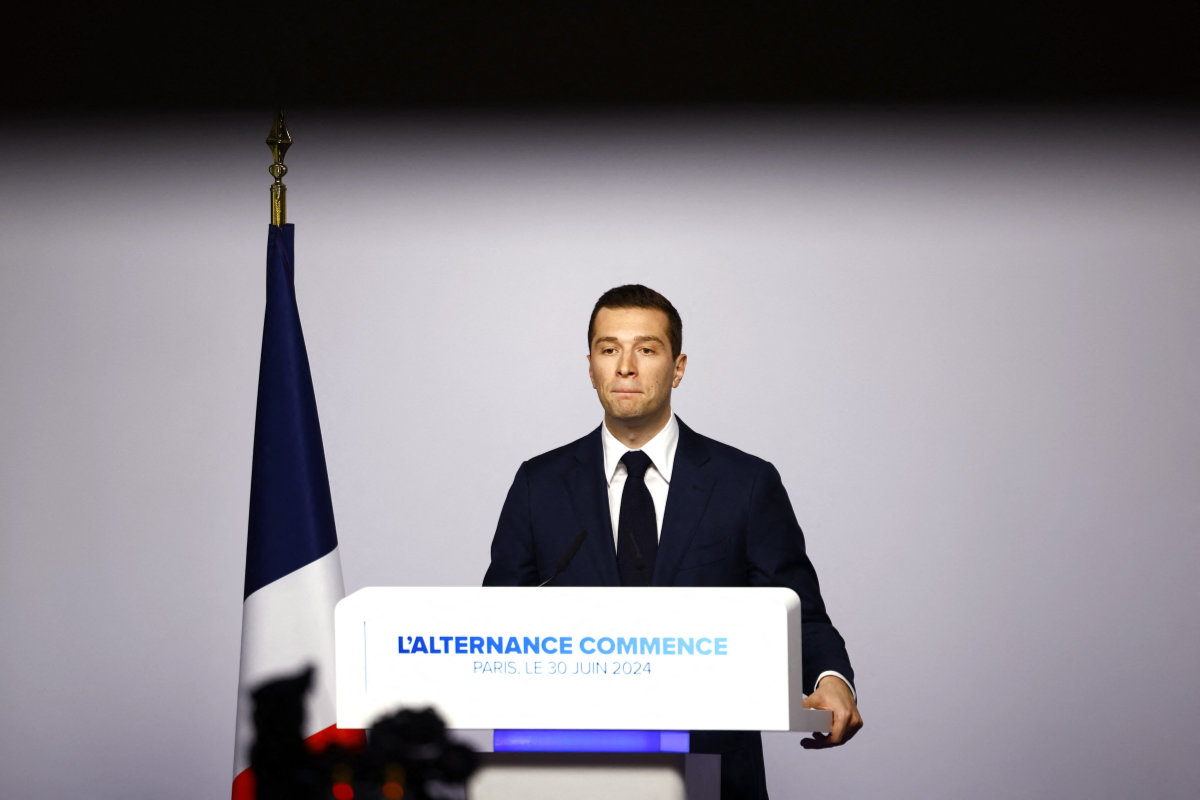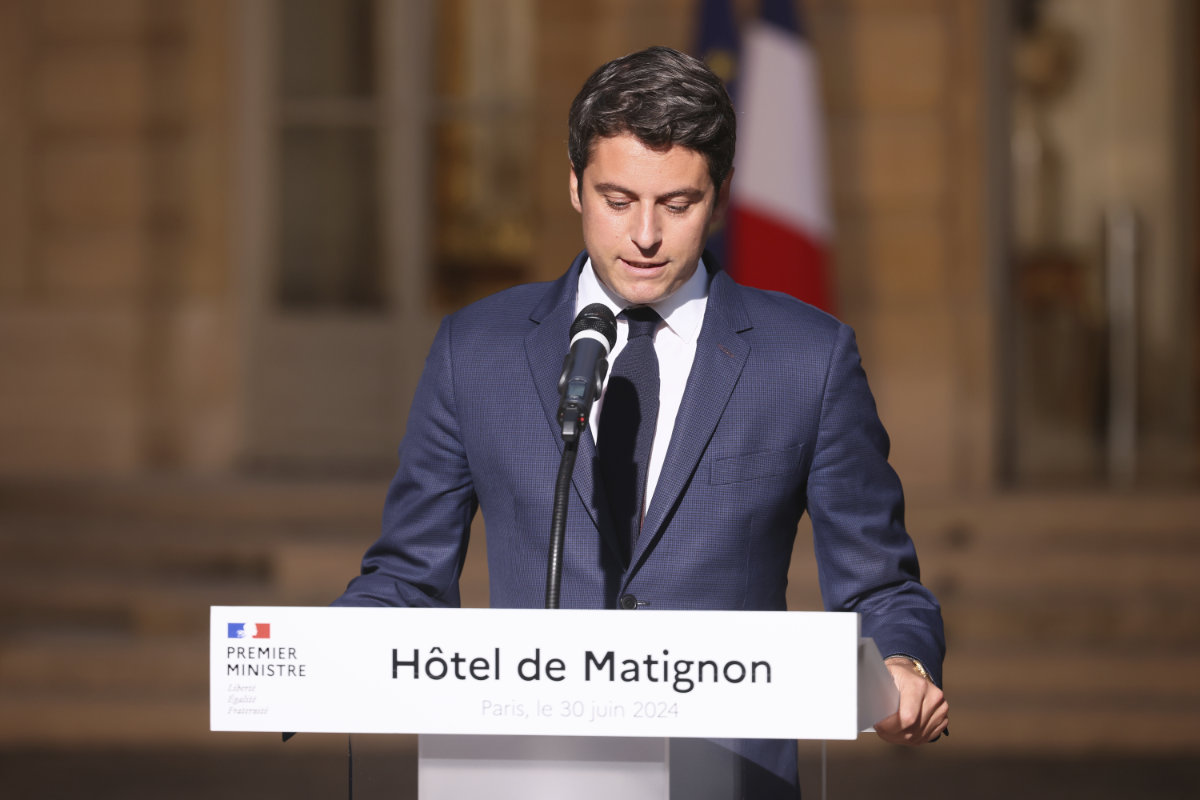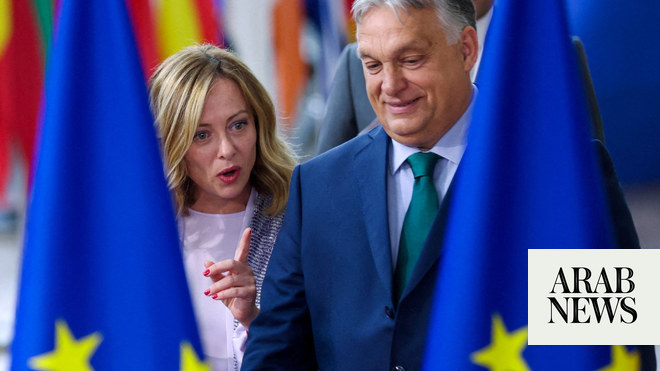PARIS: French voters face a decisive choice on July 7 in a second round of snap parliamentary elections that could produce the country’s first far-right government since Nazi occupation in World War Two — or no majority at all.
Projections from polling agencies show the far-right National Assembly has a good chance of winning a majority in the lower house of parliament for the first time, but the outcome remains uncertain amid a complex voting system.
In the first round on Sunday, the National Assembly came out on top with about one-third of the vote. The New People’s Front coalition, which includes the center-left, Greens and hard-leftists, took second place, ahead of President Emmanuel Macron’s centrist alliance.
Here’s a closer look:
How does it work?
The French system is complex and disproportionate to the support of a party across the country. Legislators are elected by district.
Over 60 candidates who won at least 50 percent of the vote on Sunday were elected directly.
In addition, the first two candidates, in addition to all others who received the support of more than 12.5 percent of registered voters, qualified for the second round.

In many constituencies, three people made it to the second round, although some tactics to block far-right candidates have already been announced: the left-wing coalition said it would withdraw its candidates in constituencies when they reach third place in order to support other politicians opposed to the far-right. Macron’s centrist alliance also said some of its candidates would withdraw before the second round to block the National Assembly.
This makes the result of the second round uncertain, despite polls showing that the National Assembly party has a good chance of winning an absolute majority, i.e. at least 289 out of 577 mandates.
The National Assembly, the lower house, is the more powerful of the two houses of the French parliament. He has the final say in the legislative process over the Senate, which is dominated by conservatives.
Macron has a presidential term until 2027 and has said he will not step down before the end of his term.
What is cohabitation?
If the National Assembly or a political force other than his centrist alliance wins a majority, Macron will be forced to appoint a prime minister who belongs to that new majority.
In such a situation — called “cohabitation” in France — the government would implement a policy that differs from the president’s plan.
The modern French Republic has experienced three cohabitations, the last under conservative President Jacques Chirac, with Socialist Prime Minister Lionel Jospin, from 1997 to 2002.
The prime minister is responsible to the parliament, leads the government and submits bills.
“In the case of cohabitation, the policies that are implemented are essentially the policies of the prime minister,” said political historian Jean Garrigues.

French President Emmanuel Macron leaves a voting booth before casting his vote at a polling station in Le Touquet, northern France, June 30, 2024. (POOL/AFP)
The president has been weakened at home during cohabitation, but still has some authority over foreign policy, European affairs and defense as he is in charge of negotiating and ratifying international treaties. The president is also the commander-in-chief of the country’s armed forces and carries the nuclear codes.
“It is possible for the president to prevent or temporarily suspend the implementation of a number of the prime minister’s projects, since he has the authority to sign or not sign government decrees or regulations,” Garrigues added.
“Nevertheless, the Prime Minister has the power to submit these ordinances and regulations for a vote in the National Assembly, thereby overcoming the reluctance of the President,” he noted.
Who leads defense and foreign policy?
During previous cohabitations, defense and foreign policy were considered the informal “reserved field” of the president, who was usually able to find compromises with the prime minister to allow France to speak with one voice abroad.
However, today the positions of both the far-right and left-wing coalitions in these areas are radically different from Macron’s approach and would likely be subject to tension during a potential cohabitation.
According to the Constitution, while “the president is the military, it is the prime minister who has the armed forces at his disposal,” Garrigues said.
“And in the diplomatic field, the president’s perimeter is significantly limited,” Garrigues added.

Jordan Bardela, president of France’s far-right National Assembly party, reacts on stage after partial results in the first round of early French parliamentary elections in Paris June 30, 2024 (REUTERS)
Far-right leader Jordan Bardella, who could become prime minister if his party wins a majority of seats, said he intends to “be a cohabiting prime minister who respects the Constitution and the role of the President of the Republic, but is uncompromising about the policies we will implement.”
Bardella said that if he became prime minister, he would oppose sending French troops to Ukraine – a possibility that Macron has not ruled out. Bardella also said he would reject French shipments of long-range missiles and other weapons capable of hitting targets in Russia itself.
What happens if there is no majority?
The president can appoint a prime minister from the parliamentary group with the most seats in the National Assembly — this has been the case with Macron’s centrist alliance since 2022.
However, the National Assembly has already said it will reject such an option, as it would mean the far-right government could soon be ousted by a no-confidence vote if other political parties join forces.
The president could try to build a broad coalition from left to right, an option that sounds unlikely, given the political differences.
Prime Minister Gabriel Atal hoped on Sunday that he could have enough centrist MPs to build “most projects and ideas” with other “republican forces”, which could include those from the left and centre-right.

French Prime Minister Gabriel Attal delivers a speech in the courtyard of the prime minister’s residence in Paris on June 30, 2024. (AP)
Experts say another complex option would be to appoint a “Government of Experts” that is not affiliated with political parties, but would still have to be accepted by a majority in the National Assembly. Such a government would probably deal mostly with day-to-day affairs rather than implementing major reforms.
If the political talks take too long in the middle of the summer holidays and the July 26-Aug. At the 11th Olympics in Paris, Garrigues said a “transitional period” during which Macron’s centrist government would “remain in charge of current affairs” was not ruled out until further decisions were made.
“Whatever the National Assembly looks like, the Constitution of the 5th Republic appears to be flexible enough to survive these complex circumstances,” Melody Mock-Gruet, an expert in public law at Sciences Po Paris, said in a written note. “Institutions are more solid than they appear, even when faced with this experimental exercise.”
“However, there remains another unknown in the equation: the population’s ability to accept the situation,” Mock-Gruet wrote.

